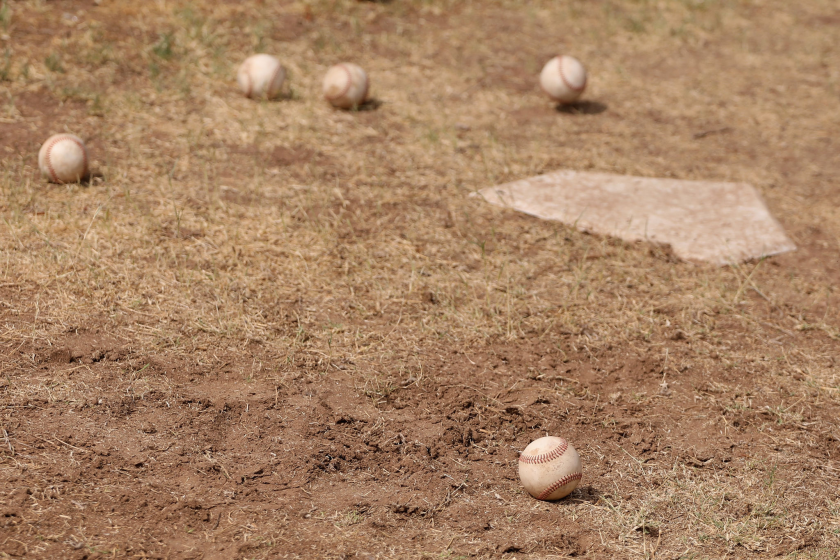They’re Trying to Take Steroids Out of the Old Ballgame
- Share via
As the new season dawns, baseball traditionally would be selling hope and hype. But five days before the opening game, the White House and Congress have nudged Commissioner Bud Selig and the players union into a national debate over the sport’s policy on steroid testing.
“The game never has been more popular,” Selig said Wednesday. “Having said that, steroids presents a very significant and a very serious issue for this sport, for its integrity and for health reasons. We need to deal with the problem.”
At spring training camps in Arizona and Florida, players wonder whether the outcry will fade, or whether a more stringent policy might be necessary to redirect attention from steroids to statistics.
“I’m tired of hearing about it, tired of talking about it, tired of hearing fans yell things.... It’s just a black eye for the game,” said Matt Herges, a pitcher for the San Francisco Giants. “Will it go away? I don’t know. I hope it does. Will it take us revamping our drug-testing program to do that? Maybe.”
Nineteen months after joining team owners in adopting the first steroid-testing program in major league history -- one derided outside the sport as weak and ineffective -- the union reluctantly has agreed to discuss the possibility of stiffer rules.
Under the program, a first offender would be ordered into counseling but would be neither suspended nor publicly identified. A five-time offender would face a one-year suspension.
Dick Pound, president of the World Anti-Doping Agency, has called the program a “complete joke.”
At a hearing this month, U.S. Sen. John McCain (R-Ariz.) threatened government intervention, telling Selig and union executive director Don Fehr that “the status quo is not acceptable.” In his State of the Union address two months ago, President Bush condemned the use of performance-enhancing substances in sports.
Said Rob Manfred, baseball’s chief labor lawyer: “We feel considerable pressure to make progress on this issue.”
Union officials did not return calls Wednesday. On Tuesday, Fehr told reporters in Florida, “You have to be willing to look at things again in light of different or changed circumstances.”
Still, the union that San Francisco first baseman J.T. Snow calls “probably the strongest union in the world” seldom loses. On their annual spring visits to each team, union leaders have stressed to players and reporters that a testing program reached through collective bargaining ought not to be branded a failure before being fully implemented.
As part of the agreement, every major league player was tested anonymously for steroid use last season in an attempt to determine the scope of the problem. Between 5% and 7% of tests were positive for use of illegal steroids, triggering random testing with penalties this year.
Baseball has created a more rigorous testing program for minor league players -- those who are not on the 40-man rosters of big league clubs. It includes year-round testing, and slaps first-time offenders with 15-day unpaid suspensions.
Selig wants to apply the same program to major leaguers.Manfred said he was “reviewing daily what options are available to us,” including the possibility of circumventing the collective bargaining agreement and unilaterally imposing the change, which the union probably would challenge as a violation of labor law.
Selig said he was concerned less with public pressure than with steroids’ uncertain and possibly harmful long-term effects.
“The one thing that really troubles me -- someday, if the doctors are right -- I don’t want some player or some family saying to me, ‘Commissioner, you knew about it and you didn’t do anything,’ ” he said. “I couldn’t live with that.”
Said Angel shortstop David Eckstein, the team’s union representative: “Everyone knows the side effects of this stuff. You’ve got to be living in a cave not to know about it.... We want to get this stuff out of the game because of integrity of the game. Man for man, you have to decide what to put in your body, but the integrity of the game is at stake.”
Last month, Atty. Gen. John Ashcroft announced the indictments of four men, including the trainer of home run record-holder Barry Bonds, on charges of illegal steroid distribution.
With his first two home runs this season, Bonds will tie his godfather, Hall of Famer Willie Mays, for third place on the all-time home run list at 660, trailing only Babe Ruth (714) and Hank Aaron (755). Bonds, who has denied using steroids, already holds the single-season record of 73 home runs. But his performances could be called into question if steroid use can be proved.
Said Eckstein, speaking generally: “It would be a sad injustice if, for what Hank Aaron did, his record is broken by someone who ... didn’t do it right.”
The season opens Tuesday with the New York Yankees facing Tampa Bay in Japan. If the steroid-trafficking charges are resolved without testimony from players at a possible trial, and Selig has not pushed through a stricter testing program by then, the wave of public pressure might dissipate.
In an election year, steroid abuse might slip from the Washington radar, players suspect. “Surely there are more pressing concerns in the world than steroids in sports, wouldn’t you agree?” Angel pitcher Ben Weber said earlier this month.
Fans, for their part, have snapped up tickets in record numbers for the coming season.
“I think a lot of people like to see the home runs and all that stuff, and I don’t think they personally care about the health of baseball players,” Weber said. “They shouldn’t care about the health of guys making millions of dollars, because we’re smart enough to know the consequences of our actions.”
The integrity issue could damage the sport, said Tom Boyd, a Cal State Fullerton marketing professor who has studied the business of baseball. As baseball falls behind pro football in popularity and struggles to attract a new generation of fans, records broken by drug-fueled players could wipe out the charm of comparing heroes in the only American pro sport in existence for a century.
“One of the few great advantages baseball has over other sports could go away,” Boyd said.
Still, he said, there is no evidence of a popular uprising.
“Sports fans have demonstrated before that they don’t care how performance is achieved,” he said. “They like the entertainment value of a performance.”
More to Read
Go beyond the scoreboard
Get the latest on L.A.'s teams in the daily Sports Report newsletter.
You may occasionally receive promotional content from the Los Angeles Times.












